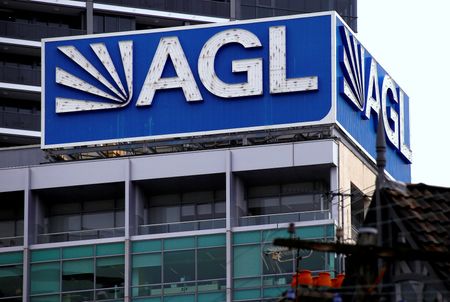
By Sonali Paul and Harshita Swaminathan
MELBOURNE (Reuters) – Australia’s top power producer AGL Energy on Monday ditched plans to split the company and said its chairman and CEO would step down, caving in to opposition from billionaire climate activist and top shareholder Mike Cannon-Brookes.
AGL’s capitulation comes as the country’s biggest carbon emitter faces increasing pressure to speed up the closure of its coal-fired power plants while funding renewable energy projects to ensure the lights stay on in the country’s shaky grid.
AGL shares fell as much as 4.6% as markets opened.
The firm maintains demerging its coal-focused generation business was the best way forward, but resistance from Cannon-Brookes meant it would not be able to secure the required majority in a shareholder vote, AGL said.
AGL would have needed approval from 75% of shares voted to split into AGL Australia, an energy retailer, and Accel Energy, a power producer. Cannon-Brookes, who has an 11.3% stake, has argued the move would do nothing to reduce emissions.
Shareholder Australian pension fund HESTA joined Cannon-Brookes in opposing AGL’s demerger, saying it does not see the split supporting decarbonisation to meet the targets of the Paris climate agreement.
“Wow. A huge day for Australia. Had to sit down & take it in,” Cannon-Brookes said in a post on Twitter. “We embrace the opportunities of decarbonisation with Aussie courage, tenacity & creativity. Lots of work but we CAN do this,” he tweeted.
AGL said it would undertake a review of its strategic direction, with a focus on potential decarbonisation initiatives and engage further with Grok Ventures, Cannon-Brookes’ investment vehicle, to discuss a way forward.
AGL added it had spent A$160 million ($114 million), out of the A$260 million it had estimated for demerger-related costs.
“By failing to set Paris-aligned targets for the proposed demerged entities, the board of AGL ignored a fundamental demand of a majority of shareholders … they’ve now paid the price,” said Harriet Kater, climate lead at the Australasian Centre for Corporate Responsibility, an investor advisory group.
‘NOT OVERLY SURPRISED’
AGL’s board said it was committed to working with all stakeholders, including government, to decarbonise AGL’s business at the fastest rate possible “while ensuring energy system stability, energy affordability for retail and industrial customers, and appropriate shareholder value outcomes”.
AGL said CEO and Managing Director Graeme Hunt will step down, but will continue in his role until a successor is named. A search for an independent chairperson is also underway, after which the incumbent Peter Botten will resign, it added.
AGL said the review of its strategic direction will include new approaches for alternate transactions.
Earlier this year, AGL received a A$5.4 billion buyout offer from Cannon-Brookes and Canada’s Brookfield Asset Management, which it rejected in March. AGL now has a market capitalisation of about A$5.92 billion.
“There is the opportunity for someone to come in and snap up AGL, but I don’t think AGL should focus on that,” said Jamie Hannah, deputy head of investments at Van Eck, among AGL’s top 15 shareholders.
“I think they should firmly focus on their long-term strategy for moving to renewables and decarbonising the electricity grid,” said Hannah, adding he was “not overly surprised” that the demerger plan was scrapped before the June 15 shareholder vote.
($1 = 1.3980 Australian dollars)
(Reporting by Harshita Swaminathan in Bengaluru and Sonali Paul in Melbourne; Editing by Himani Sarkar)

